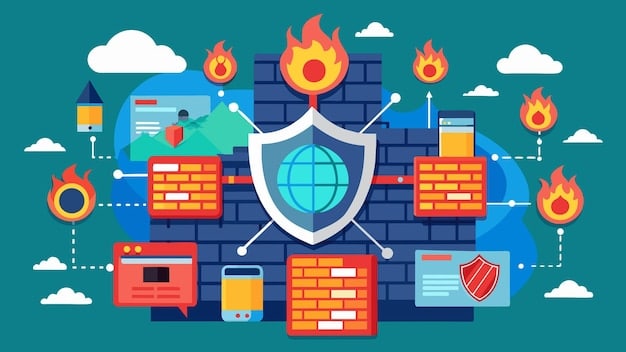Startup Cybersecurity: Protecting Your Data and Reputation

Startup cybersecurity is crucial for protecting sensitive data and maintaining a strong business reputation, requiring a proactive approach to identify and mitigate potential cyber threats.
In today’s digital landscape, a robust cybersecurity strategy is not just an option but a necessity for startups. Understanding and implementing effective startup cybersecurity measures can protect your data, reputation, and ultimately, the future of your business from ever-evolving cyber threats.
Why Startup Cybersecurity is Crucial
Startups often operate with limited resources and a focus on rapid growth, which can lead to neglecting cybersecurity. However, this can be a costly mistake. A single cyberattack can have devastating consequences, potentially crippling operations and eroding customer trust. Implementing proactive cybersecurity measures is essential for long-term success.
The Risks Startups Face
Startups are particularly vulnerable to cyberattacks due to their often immature security infrastructure and high-value data. Hackers see them as easy targets, potentially holding valuable intellectual property, customer data, or even financial information. Understanding these risks is the first step in building a strong defense.
Cost of a Data Breach for Startups
The aftermath of a data breach can be financially crippling for a startup. Beyond the immediate costs of remediation and legal fees, the damage to reputation can be irreparable. Customers may lose trust, and potential investors might shy away, hindering growth and long-term viability.
- Financial Losses: Covering costs of data recovery, legal settlements, and regulatory fines.
- Reputational Damage: Loss of customer trust and brand value.
- Operational Disruptions: Downtime and recovery efforts that can paralyze business activities.
- Loss of Competitive Advantage: Exposure of sensitive data like trade secrets or innovative ideas.
Investing in startup cybersecurity is not merely an expense but a strategic investment in the longevity and success of your business. By understanding the risks and implementing appropriate security measures, startups can protect themselves from becoming easy targets and build a foundation of trust with their customers.

Building a Cybersecurity Plan
Developing a comprehensive cybersecurity plan is crucial for startups. This plan should outline the specific measures and strategies your business will implement to protect itself from cyber threats. A well-structured plan will serve as a roadmap, guiding your actions and ensuring that no critical areas are overlooked.
Assess Your Risks and Vulnerabilities
The first step in creating a cybersecurity plan is to identify your specific risks and vulnerabilities. This involves analyzing your systems, data, and processes to uncover any potential weaknesses that hackers could exploit. Consider conducting a thorough risk assessment to gain a clear understanding of your current security posture.
Implement Basic Security Measures
There are several fundamental security measures that every startup should implement. These basics serve as a foundation for your overall cybersecurity strategy. Strong passwords, multi-factor authentication, and regular software updates are just a few examples of these critical safeguards.
- Strong Passwords: Require employees to use complex, unique passwords and enforce regular password changes.
- Multi-Factor Authentication: Enable MFA on all critical accounts and systems to add an extra layer of security.
- Software Updates: Keep all software, including operating systems and applications, up-to-date with the latest security patches.
- Firewall: Setup a firewall to safeguard your system from threats.
A robust cybersecurity plan is a living document that should be regularly reviewed and updated to keep pace with evolving threats. By investing in proper planning and implementing basic security measures, startups can create a strong defense against cyberattacks and protect their valuable assets.
Training Your Team
Even with the best technology and security measures, human error can still be a major vulnerability. Effective cybersecurity training for your team is essential to raise awareness, educate employees about potential threats, and empower them to make informed decisions. A well-trained team can act as a first line of defense against cyberattacks.
Why Training Matters
Employees are often the weakest link in the cybersecurity chain. They can unknowingly fall victim to phishing scams, download malicious software, or accidentally expose sensitive data. Training equips them with the knowledge and skills they need to recognize and avoid these threats.
Key Training Topics
Cybersecurity training should cover a range of topics, including phishing awareness, password security, data handling best practices, and safe internet usage. Tailor the training to your specific business needs and industry regulations to ensure it is relevant and effective.
- Phishing Awareness: Teach employees to identify and report suspicious emails, links, and attachments.
- Password Security: Educate on creating strong passwords and using password managers.
- Data Handling: Train employees on secure data storage, transmission, and disposal practices.
- Internet Safety: Provide guidance on safe browsing habits and avoiding malicious websites.
Investing in your team’s cybersecurity education is an investment in the overall security of your startup. By equipping your employees with the necessary knowledge and skills, you can significantly reduce the risk of human error and strengthen your defenses against cyber threats. Continuous learning and regular refresher training can ensure that your team remains vigilant and prepared.

Utilizing Cybersecurity Tools and Technologies
In addition to planning and training, leveraging the right cybersecurity tools and technologies is critical for protecting your startup. These tools can automate security tasks, monitor your systems for threats, and provide advanced protection against sophisticated cyberattacks.
Essential Cybersecurity Tools
There is a wide range of cybersecurity tools available, each designed to address specific security needs. Firewalls, antivirus software, intrusion detection systems, and vulnerability scanners area few examples of the essential tools that can help protect your startup.
Cloud Security Considerations
Many startups rely heavily on cloud services such as AWS, Azure, or Google Cloud for their operations. Securing your data and applications in the cloud requires a different approach than traditional on-premise security. Understanding the security features offered by your cloud provider and implementing appropriate security measures is crucial.
Securing cloud environments involves several key strategies:
- Access Control Policies: Implementing strict access control policies to limit who can access sensitive data and systems.
- Encryption: Encrypting data both in transit and at rest to protect it from unauthorized access.
- Monitoring Tools: Utilizing monitoring tools to detect and respond to security incidents in real-time.
By utilizing the right cybersecurity tools and technologies, startups can automate security tasks, monitor their systems for threats, and provide advanced protection against sophisticated cyberattacks. These tools empower you to proactively defend your network, data, and reputation.
Incident Response and Recovery
Despite the best efforts to prevent cyberattacks, incidents can still occur. Having a well-defined incident response and recovery plan is essential to minimize the damage and restore operations quickly. This plan should outline the steps to be taken in the event of a cyberattack, including detection, containment, eradication, and recovery.
Creating an Incident Response Plan
An incident response plan should involve identifying key personnel, defining roles and responsibilities, and establishing communication channels. Regular testing and simulations can help ensure that the plan is effective and that everyone knows what to do in the event of a real incident.
Recovering from a Cyberattack
The recovery phase involves restoring systems, data, and operations to their normal state. This may involve restoring from backups, rebuilding systems, and implementing additional security measures to prevent future attacks. Clear communication with customers and stakeholders is important during the recovery process.
Ensuring a proper backup strategy is crucial for data recovery following a cyberattack. Key components include:
- Regular Automated Backups: Setup daily or weekly backups to a location that isn’t on your primary network.
- Secure Storage of Backups: Protect storage with encryption and access control policies.
- Testing Backups: Regularly test and verify backups to be ready for restoration in case needed.
By having a well-defined incident response and recovery plan, startups can minimize the damage caused by cyberattacks and quickly restore operations. Preparation and planning, combined with swift and decisive actions, can help you weather the storm and emerge stronger.
Staying Up-to-Date with Cybersecurity Trends
The cybersecurity landscape is constantly evolving, with new threats and vulnerabilities emerging all the time. Staying up-to-date with the latest cybersecurity trends and best practices is critical for maintaining a strong security posture. This involves continuous learning, monitoring industry news, and adapting your security measures as needed.
Following Industry News and Resources
There are numerous reputable cybersecurity news sources, blogs, and organizations that provide valuable information about emerging threats, vulnerabilities, and best practices. Subscribing to newsletters and following industry experts on social media can help you stay informed.
Adapting Your Security Measures
As new threats emerge, it is important to adapt your security measures accordingly. This may involve implementing new technologies, updating your policies and procedures, or providing additional training to your team. Regular security audits and penetration testing can help identify any gaps in your security posture.
Staying informed about emerging technologies and threats is essential:
- Artificial Intelligence (AI): Leveraging AI for threat detection and response.
- Blockchain Technology: Enhancing security through blockchain-based solutions.
- Quantum Computing: Preparing for potential cryptographic vulnerabilities posed by quantum computers.
By staying up-to-date with the latest cybersecurity trends and best practices, startups can maintain a proactive approach to security and protect themselves from emerging threats. Continuous learning, adaptation, and innovation are essential for staying ahead of the curve in the ever-evolving cybersecurity landscape.
| Key Point | Brief Description |
|---|---|
| 🛡️ Risk Assessment | Identify vulnerabilities to address potential threats proactively. |
| 🧑💻 Team Training | Educate employees about cybersecurity best practices. |
| 🛠️ Security Tools | Implement firewalls, antivirus, and intrusion detection. |
| 🚨 Incident Response | Have a clear plan to minimize damage and restore operations quickly. |
FAQ
▼
Cybersecurity is crucial for startups because they are often targets for cyberattacks due to their limited resources and immature security infrastructure. Protecting data and reputation is essential for survival and growth.
▼
Startups should implement strong passwords, multi-factor authentication, regular software updates, firewalls, and antivirus software as basic cybersecurity measures to protect their systems and data.
▼
Cybersecurity training should be conducted regularly, at least annually, and more frequently depending on the specific risks and threats faced by the startup. Regular refresher training is also important.
▼
An incident response plan should include key personnel, their roles and responsibilities, communication channels, steps for detection, containment, eradication, and recovery, as well as regular testing and simulations.
▼
Startups can stay up-to-date by following industry news sources, blogs, and organizations, subscribing to newsletters, following industry experts on social media, and conducting regular security audits and penetration testing.
Conclusion
Implementing a robust startup cybersecurity strategy is essential for protecting your business, data, and reputation. By understanding the risks, creating a cybersecurity plan, training your team, utilizing security tools, and staying up-to-date with industry trends, you can build a strong defense against cyber threats and secure the future of your startup.





